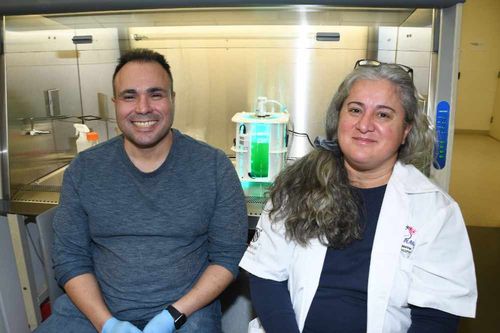DSU receives $300,000 grant for microalgae research

Ali Parsaeimehr and Gulnihal Ozbay are the Principal Investigator and Co-PI, respectively, on a research grant in which they are developing microalgae for dual purposes – as a bioenergy source and for use as a pharmaceutical. / SOURCE: DSU
December 29, 2023
BY Delaware State University
The USDA recently awarded two Delaware State University researchers a three-year just under $300,000 grant for a project that could leverage the properties of microalgae toward energy and cancer treatment purposes.
The research is being led by Ali Parsaeimehr, Principal Investigator (PI) and DSU Postdoctoral Researcher, and Gulnihal Ozbay, Co-PI and Professor of Natural Resources and Associate Dean of Cooperative Extension.
The technical title of the project is “A Multiple-Stage Cost Effective Smart Farming of Engineered Microalgae for Simultaneous Production of High-Value Molecules and Bioenergy.”
Advertisement
Advertisement
The research involves 1). Converting microalgae into bio-energy/biofuels, and 2.) Using microalgae to develop a more cost effective alternative for the production of taxol, an anti-cancer pharmaceutical.
“We are working to produce a bio-energy source and to express and isolate high value compounds for the pharmaceutical industry to produce taxol,” Parsaeimehr said. He added that using microalgae to produce taxol “would reduce the cost and it would grow more bio-mass – meaning we could grow more of it in a shorter amount of time.”
Advertisement
Advertisement
Ozbay noted that the project provides students with great research experience.
“This project provides opportunities for both undergraduate and graduate students to involve in innovative research that has strong molecular and technical requirements students can develop their skills on,” Ozbay said. “These type of experiences and training will make our students more competitive for job market.”
The research is being conducted in the Ag Annex’s One Health Lab, where research is focused on three components – environmental, animal and human health.
Related Stories
The USDA significantly increased its estimate for 2025-’26 soybean oil use in biofuel production in its latest World Agricultural Supply and Demand Estimates report, released July 11. The outlook for soybean production was revised down.
U.S. fuel ethanol capacity fell slightly in April, while biodiesel and renewable diesel capacity held steady, according to data released by the U.S. EIA on June 30. Feedstock consumption was down when compared to the previous month.
The U.S. EPA on July 8 hosted virtual public hearing to gather input on the agency’s recently released proposed rule to set 2026 and 2027 RFS RVOs. Members of the biofuel industry were among those to offer testimony during the event.
The USDA’s Risk Management Agency is implementing multiple changes to the Camelina pilot insurance program for the 2026 and succeeding crop years. The changes will expand coverage options and provide greater flexibility for producers.
The USDA’s National Agricultural Statistics Service on June 30 released its annual Acreage report, estimating that 83.4 million acres of soybeans have been planted in the U.S. this year, down 4% when compared to 2024.
Upcoming Events










